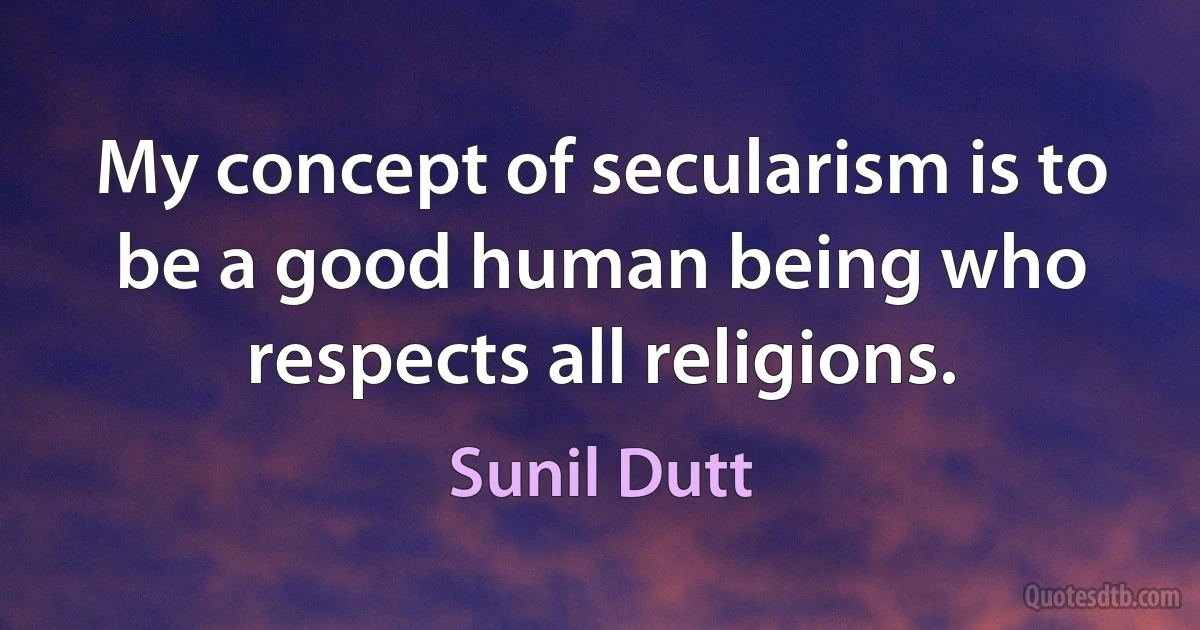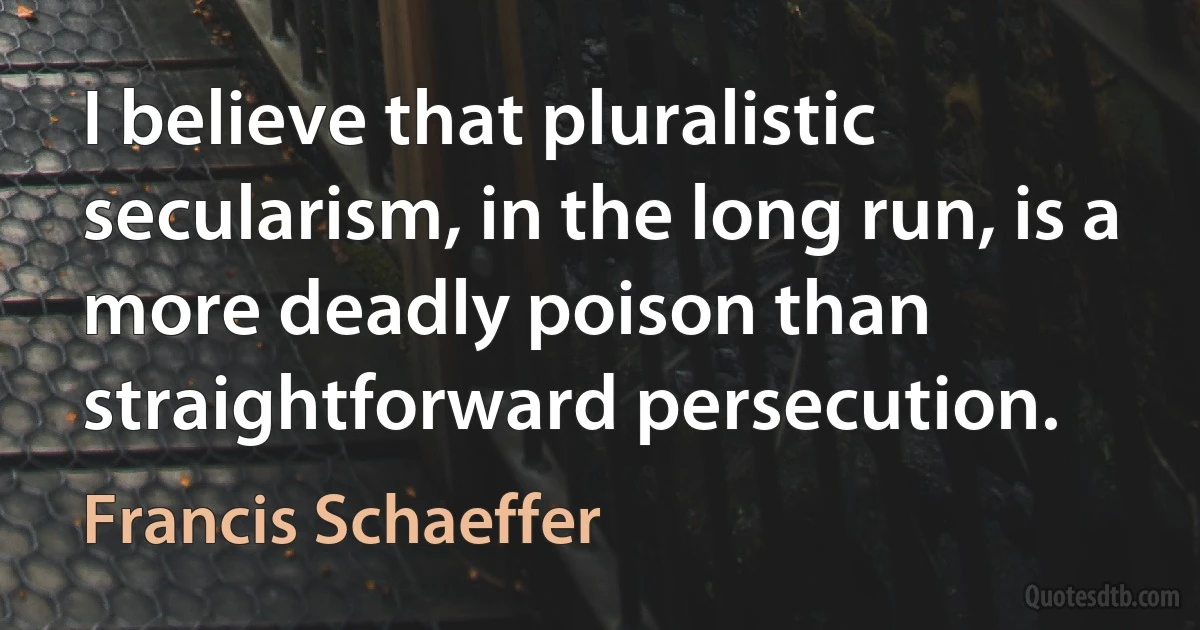Secularism Quotes - page 2
We separate church and state affairs in this country, and for good reason. No religion should dictate to the state nor should the state interfere with the free practice of religion. But in recent years, the notion of the separation of church and state has been taken by some well beyond its original meaning. They seek to remove from the public domain any acknowledgment of God. Religion is seen as merely a private affair with no place in public life. It is as if they are intent on establishing a new religion in America - the religion of secularism. They are wrong.

Mitt Romney
Yes, secularism does propose a physical and purposeless universe, and many (but not all) of us accept the notion that our sense of self is a neuronal illusion. But although the universe is purposeless, our lives aren't. This conflation of a purposeless universe (i.e., one not created for a specific reason) with purposeless human lives is a trick that the faithful use to make atheism seem nihilistic and dark. But we make our own purposes, and they're real. Right now my purpose is to write this piece, and then I'll work on a book, and later I'll have dinner with a friend. Soon I'll go to Poland to visit more friends. Maybe later I'll read a nice book and learn something. Those are real purposes, not illusory purposes to which Douthat wants us to devote our only life.

Jerry Coyne
Our party is for the building of the temple to Lord Ram, and we should, if possible, work towards an amicable settlement which, while upholding the principles of secularism, enables the construction of the temple to start, with the approval and support of all concerned. ... The key issue appears to be whether or not there was a temple erected to Lord Ram at the site where the Babri Masjid stands today. This question of historical fact would appear to hold the key to a resolution of the problem to the satisfaction of all reasonable, secular-minded persons of all communities.

Rajiv Gandhi
A right value system must be built into our education system. We must be very clear that religion and politics must be separated and there must be a very clear definition of the difference between spirituality of the religion and its rituals and dogmas. We must be clear that secularism as we understand it is not only anti-religion or non-religion; it is only the separation of government from religion. Religion has a great role to play in the development process of our nation and we should do nothing to undermine it.

Rajiv Gandhi
Nothing is more important than the unity and integrity of our nation. India is indivisible. Secularism is the bedrock of our nationhood. It implies more than tolerance. It involves an active effort for harmony. No religion preaches hatred and intolerance. Vested interests, both external and internal, are inciting and exploiting communal passions and violence to divide India.

Rajiv Gandhi
Some have recently argued that pluralism by its very nature demands civic secularism. There seems to be no logical reason why respect for the beliefs of more than a quarter billion Americans, 90 percent of whom declare themselves to be religious, should require us now to eschew the public expression of religion, even in discussing political affairs that have moral foundations or implications.

Francis George
Secularism, at its absolute best, comprises an unrelenting commitment to judicious and self-correcting critique. ... Secularism's "job” consists of criticizing all collective representations. Its analytical energies should be inflicted on any type of mass belief or empowered orthodoxy, whether it is religious, political, scientific, aesthetic, and so on. ... Secularism, as we envision it, is elitist and heretical by nature. When it aspires to become a popular movement, an orthodoxy, or the predicate of a nation-state, it betrays itself.

Jacques Berlinerblau
Secularism needs to be adapted to diverse cultural conditions if it is to gain ground. I submit that we cannot legislate secularism uberhaupt without recognizing the cultural traditions in which it emerges. Accordingly, multi-secularism seems to be the best strategy to pursue: that is, adapting secular ideas and values to the societies in which they arise.

Paul Kurtz
For the Muslim, religion traditionally was not only universal but also central in the sense that it constituted the essential basis and focus of identity and loyalty. It was religion which distinguished those who belonged to the group and marked them off from those outside the group. A Muslim Iraqi would feel far closer bonds with a non-Iraqi Muslim than with a non-Muslim Iraqi. Muslims of different countries, speaking different languages, share the same memories of a common and sacred past, the same awareness of corporate identity, the same sense of a common predicament and destiny. It is not nation or country which, as in the West, forms the historic basis of identity, but the religio-political community, and the imported Western idea of ethnic and territorial nationhood remains, like secularism, alien and incompletely assimilated.

Bernard Lewis
Ultimately, the struggle of the fundamentalists is against two enemies, secularism and modernism. The war against secularism is conscious and explicit, and there is by now a whole literature denouncing secularism as an evil neo-pagan force in the modern world and attributing it variously to the Jews, the West, and the United States. The war against modernity is for the most part neither conscious nor explicit, and is directed against the whole process of change that has taken place in the Islamic world in the past century or more and has transformed the political, economic, social, and even cultural structures of Muslim countries. Islamic fundamentalism has given an aim and a form to the otherwise aimless and formless resentment and anger of the Muslim masses at the forces that have devalued their traditional values and loyalties and, in the final analysis, robbed them of their beliefs, their aspirations, their dignity, and to an increasing extent even their livelihood.

Bernard Lewis
They who interpret secularism as dharma-nirpekshata fail to understand either dharma or secularism. A secular state does not mean an anti-religious state, nor even an irreligious state. For, in that sense, the people of India just never can become secular. A secular state simply means a state which does not identify itself with any specific mode of worship and holds the balance even between all sects- secularism thus mean sampradayanirpekshata and not dharma-nirpekshata.

Atal Bihari Vajpayee
The Congress for some time remained as a respectable residue. But a comprehensive party cannot survive too long as a residue. It may be small in size at a given time, but its composition should still remain comprehensive. This could be termed as the widest connotation of secularism. The Congress, therefore, is the most secular party in the real sense.

P. V. Narasimha Rao
...success part of story of fifty years of Independence ... Maintaining and strengthening political democracy at various levels has moved to new levels. Conducting successive free and fair elections, evolving and developing institutions like a relatively independent press, functioning opposition parties offering role choice, an independent and high calibre judiciary, free public debate which sometimes comes under assault, defying freedom of expression and creativity and secularism as the basic feature of our constitutional and social well being.

K. R. Narayanan



